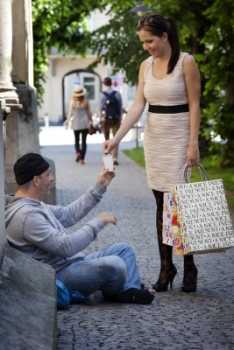A couple of years ago I read an article from the New York Times entitled “Raising a Moral Child”. Although the piece is secular, I found the entire article interesting . . . not least of which because I’m trying to raise a moral son of my own. Probably the most fascinating part of the feature for me was toward the end, where it recounts an experiment from the 1970s. In this experiment, an adult taught children how to play a game the researcher devised. The adult would either teach the children to be selfish or unselfish in how they acquired tokens in the game. Then the adult would either perform selfishly or unselfishly during the game (so that the children could observe). In other words, there were four possibilities:
- Teacher preached being selfish; teacher was selfish in action.
- Teacher preached being selfish; teacher was generous in action.
- Teacher preached being generous; teacher was selfish in action.
- Teacher preached being generous; teacher was generous in action.
The results were somewhat surprising. When the teacher was selfish in action, then so were the children, regardless of what the teacher preached. That result makes intuitive sense; the truism “actions speak louder than words” was even repeated in the article.
However, what was really interesting was that teaching the children to be generous or selfish had no effect on how generous the students were. What mattered was if the instructor exhibited generosity; if so, the children gave 49% more than the norm, even if the instructor had taught the children they should be selfish.
Of course, as followers of Christ, we’ve known this for almost two thousand years.
In today’s portion of the Gospel of Matthew (6:1-6, 16-18), Jesus goes to great lengths to explain how the act of sacrifice is infinitely more powerful than the appearance of sacrifice. We shouldn’t give to charity, or perform righteous deeds, or pray, or fast, solely because we expect a reward in this world. And “reward” doesn’t just mean personal puffery or social status; as the research proved, the reward of having raised moral children – a goal most parents have – can’t be achieved by saying we’re serving God. What’s most important is actually doing so, without thought of reward, recognition, or recompense.
Jesus spoke out time and again against the hypocrites of the world. However – with this selection from Matthew – perhaps Jesus is once again proving how he was both fully divine and fully human; although unstained by original sin, he still recognized and understood the broken nature of humanity and our tendency toward hypocrisy. Perhaps Jesus encourages us to harness our innate hypocritical tendencies, using that urge to serve God. If there is going to be a divide between what you say and what you do, make sure the hypocrisy is in serving the Lord. Jesus touches on this divide again between what is said and what is done in the Parable of the Two Sons – see Matthew 21:28–32 – when he asks, “Which of the two did his father’s will?”
Like the eager eyes of learning children, our Father in heaven sees all. Our children see our private actions and use those examples as the foundation of their morality, while our Father sees our private actions to tell if our hearts have truly embraced the truth of Christ. Let us live as Jesus commanded and do what is right discreetly; those who need to see will do so.

